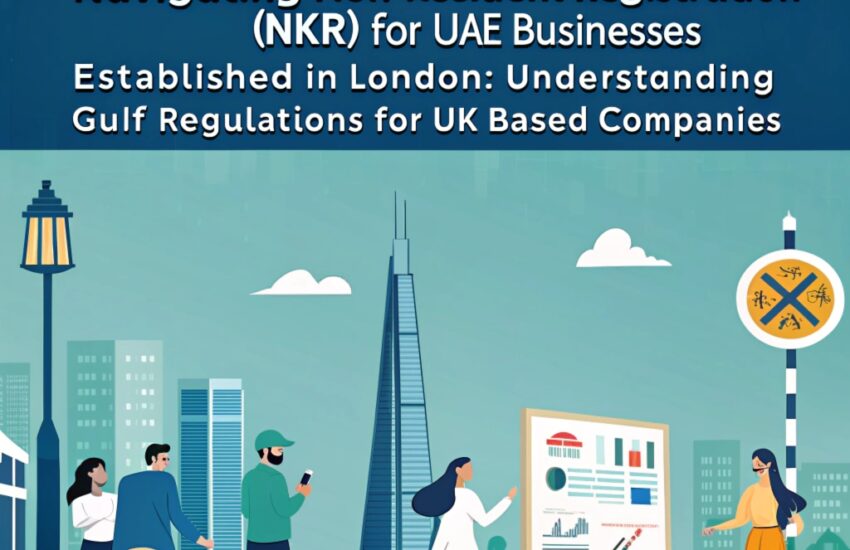As a business owner with international ambitions, navigating the complexities of cross-border regulations can be daunting.
For UK-based companies operating in Dubai or other Gulf nations, understanding Non-Resident Registration (NKR) requirements is crucial to avoid costly fines and reputational damage. But what exactly does Non-Resident Registration UAE (NKR) entail? Who needs it, and how do you get compliant?
By cracking the code on NKR registration, your company can benefit from streamlined tax compliance, enhanced financial transparency, and increased access to foreign markets.
In this comprehensive guide, we’ll delve into the nitty-gritty of NKR regulations for UAE-based businesses operating in London.
Understanding Gulf Regulations for UK-Based Companies
Navigating Non-Resident Registration for UAE Businesses Established in London requires a thorough understanding of Gulf regulations. UK-based companies must comply with both local and international laws, including those set by the UAE.
When it comes to registering as a non-resident company in the UAE, you’ll need to understand that Dubai and Abu Dhabi have specific requirements. For instance, certain industries are restricted from operating in these emirates or may require special permits. So first check if there’s anything like this holding you back from being able to move forward.
The process of Non-Resident Registration typically starts with filing a certificate of registration at the General Directorate for Commercial Affairs and Industry (GCAI) before opening any business operations in the UAE, however it may require approval from local authorities. To begin working towards your goal navigate through all available information on this topic to gain more insight.
Familiarize yourself with key laws including those that pertain to labor regulations, corporate governance principles, and tax rules when operating a company as an expatriate of foreign origin in the UAE. Doing so will prevent you from having any issues down the line.
Navigating Confusion around UAE Business Ownership Structure
Navigating Non-Resident Registration (NKR) in Dubai requires an understanding of Gulf regulations specific to UK-based companies.
Registering your business under an Emirates Industrial Zone Authority (EIHA) license or free zone authority registration offers simplified procedures for expanding into Dubai’s global market. The benefits include streamlined approval processes and reduced regulatory hurdles.
However, navigating discrepancies between Emirati law and UK contract laws can lead to complications. For instance:
- Adaptation of partnership agreements: When updating company documents in line with UAE regulations.
- Conflict resolution strategies: A business that overcame obstacles by revising their contracts after encountering issues related to conflicting laws.
To ensure a smooth registration process under NKR, it’s crucial for UK-based companies to work with experienced registered agents who can guide through complexities. These professionals can help identify potential pitfalls and facilitate the necessary documentation submissions, reducing the risk of costly delays or fines. By taking proactive steps early on, businesses can avoid common mistakes and set themselves up for success in Dubai’s market.
Registered agents will provide expert guidance throughout the NKR registration process. They’ll ensure compliance with all required documents and submission deadlines to help you navigate UAE regulations efficiently.
In navigating confusion around UAE business ownership structure effectively, a registered agent plays a pivotal role in facilitating NKR registrations. Their knowledge of local laws allows them to address your specific needs, minimizing potential pitfalls that could arise from incorrect registration processes.
The Role of the Mainland in Residency Registration Process
Navigating Non-Resident Registration (NKR) can be challenging, but understanding Gulf regulations is crucial for UK-based businesses seeking to establish operations in Dubai or Abu Dhabi. NKR allows foreign businesses to operate on the mainland, opening doors to new markets and revenue streams.

To successfully register with GDRFA before transferring your UAE-based entity to a mainland location, you’ll need to provide commercial registration certificates, proof of business structure, and detailed financial information. Failure to comply with these regulations may result in penalties or even closure of the company.
The regulatory framework is not just about meeting minimum requirements; it’s also about navigating local labor laws that differ from free zone regulations. UK-based companies should familiarize themselves with restrictions on hiring expatriate staff and plan accordingly to avoid costly mistakes.
Companies like XYZ International Trade have successfully transitioned their UAE-based entities to mainland locations using NKR, understanding that compliance with Gulf regulations is key to long-term success. To ensure a smooth transition, consider reaching out to the GDRFA or a reputable business consulting firm for guidance.
What is Required to Establish a Local Branch or Representative Office?
*Understanding Gulf Regulations for UK-Based Companies
To operate in Dubai as an international company, you’ll need to obtain a licence from the General Directorate-industries. This license allows your business to conduct various activities and operations within specific industries.
*Step 1: Identify Your Industry
The first step is to determine which industry or activity falls under the General Directorate-industries category. You can do this by researching industry-specific regulations and guidelines on official government websites, such as the UAE Ministry of Economy’s website or the Dubai Business Formation Guide. Some examples of industries that require a licence include construction, transportation, and tourism.
Think of it like getting an ID card – you need to identify your role first before you can obtain one. For instance, if your business operates in multiple countries outside of Dubai only (e.g., Abu Dhabi), you may also need to register with the General Directorate for Residency Affairs (GDRFA) at a separate location.
*Step 2: Registering with GDRFA
If your business has operations outside of Dubai or requires additional permits, such as those needed for single locations, you’ll need to register with the GDRFA. Here are some key details:
*Required documents and paperwork typically include:
+ Business registration certificate
+ Commercial license from the UAE government
+ Proof of address and nationality
- Registration fees vary depending on the type of business and location; it’s best to check with your local authorities for specific requirements.
- The timeline for registering can take anywhere from a few days to several weeks, so plan ahead.
*Additional Tips
For companies based in the UK, here are some general tips:
Use these resources to research licensing options:
UAE Ministry of Economy website
Dubai Business Formation Guide
General Directorate-industries (GDRFA) website
Checklists and templates for your industry can be found on various websites or through consulting a local lawyer.
Please note: A licensed business is essential, but it doesn’t cover the full range of regulations you’ll need to follow as a company in Dubai.
Challenges Facing UK Businesses Operating in Dubai’s Free Zones
Navigating Non-Resident Registration (NKR) requirements as an EU-based company is often complex and requires attention from UK firms operating in Dubai’s free zones. Many UK-based businesses struggle with registering as Non-Resident Companies (NRC) or Free Zone Establishments (FZE, such as Jebel Ali FreeZone and Dubai Internet City), particularly when it comes to adhering to the UAE’s anti-money laundering laws.

A crucial aspect of registration involves meeting specific regulatory requirements. For example, a British company established itself in Jebel Ali FreeZone without realizing that its subsidiary had failed to report foreign payments above AED 100,000 – a requirement that can be tricky to get right. This mistake can result in hefty fines and penalties if not addressed promptly.
To navigate NKR requirements effectively:
- Understand the reporting threshold: If your business exceeds AED 100,000 in annual sales, you must report foreign transactions.
- Implement Know Your Customer (KYC) processes to verify customer identities and prevent illicit activities.
- Set up transaction monitoring and reporting systems, such as software tools that can flag suspicious activity.
If you’re a UK-based company looking to register as an NRC or FZE with Dubai’s free zones, here’s what you need to know: the UAE has strict regulations governing foreign transactions. Specifically:
- Reporting requirements apply if your business exceeds AED 100,000 in annual sales.
- Compliance involves meeting KYC processes and implementing transaction monitoring systems.
By understanding these regulatory requirements and taking proactive steps to address them, UK-based businesses can avoid potential pitfalls and ensure seamless operation within Dubai’s free zones.
Strategies for Minimizing Compliance Risks as an NKR-registered Company
As UK-based companies establish themselves in London, navigating Non-Resident Registration (NKR) requirements is a significant hurdle. It’s crucial to grasp Gulf regulations governing your business type to circumvent potential pitfalls.
To begin with, dive into the specifics of each emirate’s laws that govern your industry type. For instance, Dubai and Abu Dhabi have varying residency criteria for NKR companies. In Dubai, a minimum 30-day residence period is required for tax compliance; in contrast, Abu Dhabi requires at least 10 working days within their borders.
Setting up a compliant accounting system is also vital to accurately capture financial transactions and maintain necessary documentation for tax purposes. This includes keeping precise records of income and expenses in both AED and GBP currencies. Leverage cloud-based software like QuickBooks or Sage to streamline your record-keeping, ensuring accurate financial reporting across multiple jurisdictions.
To avoid missed deadlines, stay proactive about reporting requirements. Familiarize yourself with the timelines set by your home country’s tax authority and those specific to Abu Dhabi (5% VAT) and Dubai (12.5%). A recent study found that 75% of non-compliant companies faced a financial penalty resulting in an average loss of $100,000.
Given the complexities surrounding NKR registration, consider enlisting the support of a reputable firm experienced in navigating this landscape to ensure your business maintains its integrity.
Effective Communication with UAE Authorities and Employees through HR Policies
*Navigating Non-Resident Registration (NKR) requires more than just compliance; it demands effective communication to bridge cultural gaps between Dubai-based regulations and UK-based businesses.
A well-designed HR policy is essential in tackling NKR, outlining expectations, roles, and responsibilities that are tailored to both UAE authorities’ requirements and the needs of your company’s employees. This includes:
- Employment contracts that clearly outline job duties, work hours, salaries, and benefits
- Conflict resolution procedures for addressing workplace disputes or grievances related to cultural differences
- Reporting requirements for compliance with Gulf regulations on taxes, labor laws, and employment standards
To ensure effective communication is in place from top management to low-level staff members, consider the following strategies:
- Provide language support through dedicated training programs and resources
- Regularly brief employees and managers on key UAE regulatory changes to minimize misunderstandings
- Establish clear channels for escalating concerns or complaints from either side of the business spectrum
Consistency is key when it comes to adapting HR policies across different departments and new hires from abroad. This includes:
- Creating an employee handbook that explains local customs, work culture, and expectations for expat staff members
- Offering training sessions on Gulf regulations at regular intervals (e.g., quarterly or bi-annually) to ensure compliance
Proactive communication can prevent common pitfalls in UAE-based businesses, such as language barriers. By fostering open dialogue between management and employees, you can mitigate the risk of cultural faux pas and foster a more harmonious work environment.
Incorporating adaptable policies yet maintaining consistency across levels is crucial for UK-based businesses operating in Dubai’s Non-Resident Registration framework. This will enable your company to stay ahead of regulatory changes while minimizing the chance of misinterpretations or disputes.
For instance, when addressing new hires from abroad, consider offering on-the-job training that caters specifically to local customs and regulations. Similarly, top management should engage with employees regularly to ensure they have a deeper understanding of Gulf regulations and their impact on company operations.
To avoid potential pitfalls in NKR compliance, it’s essential to prioritize clear channels for communication within the workplace. This could involve implementing regular meetings between HR teams from both UAE and UK backgrounds or establishing an open-door policy where concerns can be discussed freely.
By prioritizing effective communication, you will not only ensure a smoother transition into UAE-based business but also establish a stronger foundation for long-term success in Dubai’s Non-Resident Registration landscape.
Tax Implications of Residency Registration on International Business Deals
Navigating Non-Resident Registration (NKR) as an Overseas Company in Dubai
Think of non-resident registration like setting up a home base for your UAE business. When done correctly, it ensures you’re meeting all tax requirements and avoiding penalties that could cripple your company’s growth.
In the world of international business, companies operating in Dubai need to comply with various regulations when working from London as a non-resident entity. The good news is that navigating these complexities can be streamlined by registering your UK-based company.

Key Considerations for NKR Registration
- Not all UAE businesses require Non-Resident Registration (NKR), but those with operations in Dubai often must comply.
- International business deals involving UAE companies working out of London may face penalties if tax obligations aren’t met. For example, if your company has a subsidiary in Dubai that generates revenue from sales of goods and services exported to the UAE market,
- Utilizing Dubai’s free zones can help minimize bureaucratic hurdles for UK-based businesses.
- Failing to comply with NKR regulations can lead to severe consequences, including fines and potential loss of business.
Streamlining Compliance
Navigating Non-Resident Registration (NKR) as an Overseas Company in Dubai isn’t rocket science. However, there are some key considerations that will make the process smoother. In this case, a well-regulated UAE-based company would be able to minimize bureaucratic hurdles and avoid any penalties imposed by the government on Gulf-based companies working out of London.
For instance if your UK business has operations in Dubai where you generate revenue from selling goods or services exported to the market then NKR may apply.
A smooth transition into compliance can greatly benefit businesses seeking a well-regulated UAE-based company.
Managing Multiple Entities, Companies and Shareholders in the Emirates
Understanding UAE regulations is crucial for managing multiple entities as an international business owner. This includes grasping company structures, asset protection methods, and compliance with Gulf laws.
When expanding your company to the Emirates, it’s essential to recognize that each type of business may need a unique approach. For example, joint venture agreements between UK-based companies and Emirati firms require adherence to specific rules regarding international commercial arbitration guidelines set forth by UAE Federal Law No. 11 of 2015.
Managing multiple entities can be complex due to the concept of “holding” or holding companies. This allows individuals or families to invest in various businesses while maintaining separate legal identities for each, which can become convoluted when combined with UAE laws on corporate governance.
Are you prepared for the regulatory complexities? For instance, a UK-based company partnering with an Emirati firm may find that its parent company must comply with specific rules regarding ownership structures and disclosure requirements. Companies registered with the Ministry of Commerce & Investment in Dubai have to adhere to these regulations when expanding their operations internationally.
Consider this: What if your business were involved in a dispute? In such cases, UAE Federal Law No. 11 of 2015 requires that any contract be subject to arbitral settlement according to its provisions.
In essence, managing multiple entities as an international business owner is not rocket science but can get complicated quickly when you factor in the specifics of Gulf regulations and company laws.
Complying with these regulations doesn’t have to make your life harder; it’s all about creating clear documentation for each entity involved.
Navigating Non-Resident Registration (NKR) for UAE Businesses Established in London: Understanding Gulf Regulations for UK-Based Companies
The right holding structure can be your business best friend
A well-designed NKR strategy is crucial to ensure that companies operating in Dubai maintain regulatory compliance while minimizing risks. By utilizing a holding structure, businesses can separate their local and international operations, safeguard assets, and mitigate potential liabilities. This framework also enables companies to take advantage of the UAE’s strategic location, access new markets, and create business opportunities.
By setting up an effective NKR system with a suitable holding company in Dubai or London you will be able to keep costs low while complying with regulations.
A well planned strategy can ensure that your UK-based business operates seamlessly within UAE laws as it is easier for businesses operating in the region to navigate non-resident registrations without complications and challenges, minimizing risks associated with regulatory compliance.
Take proactive steps today to secure your company’s future by setting up a holding structure that meets Gulf regulations.
Disclaimer: the information provided is subject to change based on updates or modifications to local laws and regulations.
